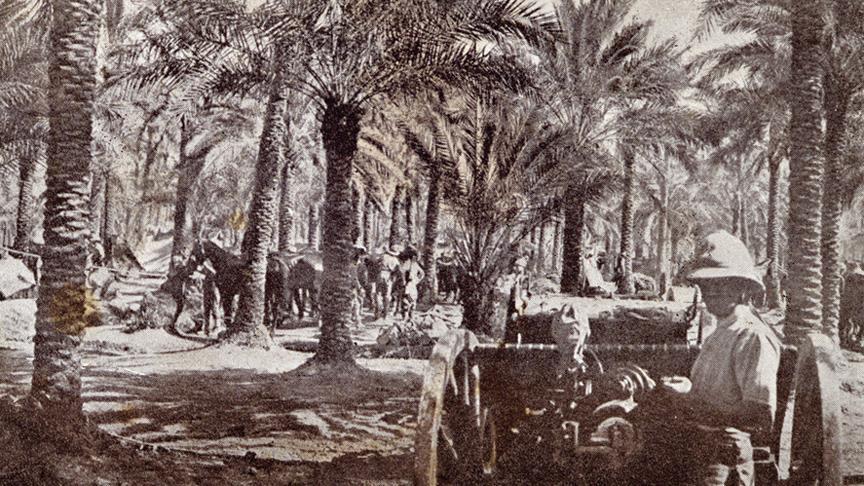Historians recall ‘most humiliating’ WWI British defeat
Friday marks centenary of one of Britain’s largely forgotten surrender to Ottoman forces in modern-day Iraq's Kut al-Amara

By Michael Sercan Daventry
LONDON
Friday marks the centenary of one of the most significant British surrenders to Ottoman forces during World War I, which some historians still remember it as the then empire's most humiliating defeat.
Precisely one hundred years ago on April 29, 1916, a British-Indian garrison laid down its arms to the Ottoman forces they were fighting in the town of Kut al-Amara in modern-day Iraq.
The city was a key step for a force of 13,000 British and Indian troops marching under Major-General Charles Townshend towards Baghdad, a target about 160 kilometers (99.4 miles) northwest along the Tigris River.
They were surrounded by Ottoman forces at Kut and, after a siege lasting around five months, Townshend capitulated.
In the words of Nikolas Gardner, associate professor at the Royal Military College of Canada, it was “the most humiliating surrender of British forces since Cornwallis's surrender at Yorktown during the American Revolutionary War in 1781.”
It was already a difficult time for Britain's war effort. Its forces had just withdrawn from Gallipoli, where it failed to break through Turkish defenses in an attempt to capture Istanbul.
Irish republicans had just launched an armed uprising in Dublin. And movement was glacial on the European front, where Allied and German troops were stationed across each other in trenches stretching from the North Sea to the Swiss border.
The initial reaction from British officials to the surrender at Kut was to play down its significance.
Stephen Badsey, professor of conflict studies at the University of Wolverhampton, said Britain’s poor military planning was not immediately clear back in London.
“The British generals in charge successfully concealed the extent of their problems, with transport and with medical evacuation in particular, and the scale of the defeat was not realized at first,” Badsey told Anadolu Agency.
In an editorial on May 1, 1916, The Times newspaper said the surrender had “very limited military importance” and the town of Kut itself was “a squalid little Arab town set in the loop of the river.”
But Gardner said it was seen differently behind closed doors.
“The British saw the defeat at Kut as a major blow to their prestige in the Middle East and India. Part of the rationale for attempting to capture Baghdad in the autumn of 1915 was to enhance Britain's prestige, particularly among Muslim subjects of the British Empire in India and Egypt.
“A war against the Ottoman Empire was problematic for many Muslims, and British authorities were concerned in 1915 that the failure of the Gallipoli campaign would increase Muslim support for the Ottomans.
“The capture of Baghdad was seen as a way of restoring Britain's image as the preeminent power in the Middle East and South Asia. This plan backfired when Townshend's division surrendered at Kut,” he told AA.
And even the Times’s editorial on May 1, 1916, could not ignore the scale of the defeat entirely: “The responsibility for the decision which has led to the unfortunate capitulation of the garrison of Kut must be probed to the bottom without delay.
“Why was this small force sent marching through deserts hundreds of miles from the sea to take a city which the Turks were given ample time to reinforce and protect?
“The ultimate responsibility for the attempt to advance to Baghdad rests with the Cabinet in London, and minsters must explain their action if they can. There was never any military justification for an advance beyond Kut.”
But in the context of the entire Mesopotamian campaign of the First World War, Kut’s significance can be overstated.
Historian Caroline Finkel points out in her Ottoman Empire chronicle “Osman’s Dream” that although “Kut still figures in the Turkish imagination as an Ottoman victory,” Baghdad still fell to the British the following year.
Retired colonel Patrick Crowley, author of “Kut 1916: The Forgotten British Disaster in Iraq”, said the defeat inspired commanders to take a new approach in Mesopotamia.
Crowley told Anadolu Agency: “After the failure of Kut, the British Empire did not take any chances in the Mesopotamia campaign. General Maude took control of the Army there and made sure that before he advanced, he had all the necessary resources.
“He defeated the Ottomans and then occupied Baghdad in March 1917.”
Anadolu Agency website contains only a portion of the news stories offered to subscribers in the AA News Broadcasting System (HAS), and in summarized form. Please contact us for subscription options.


